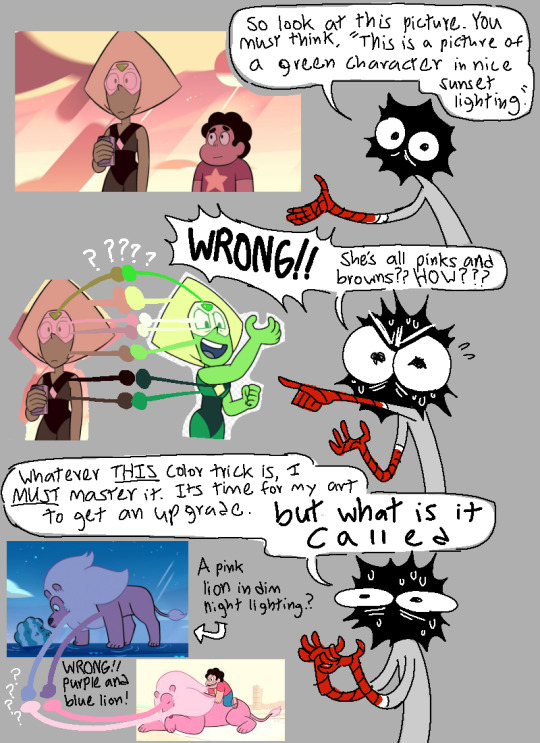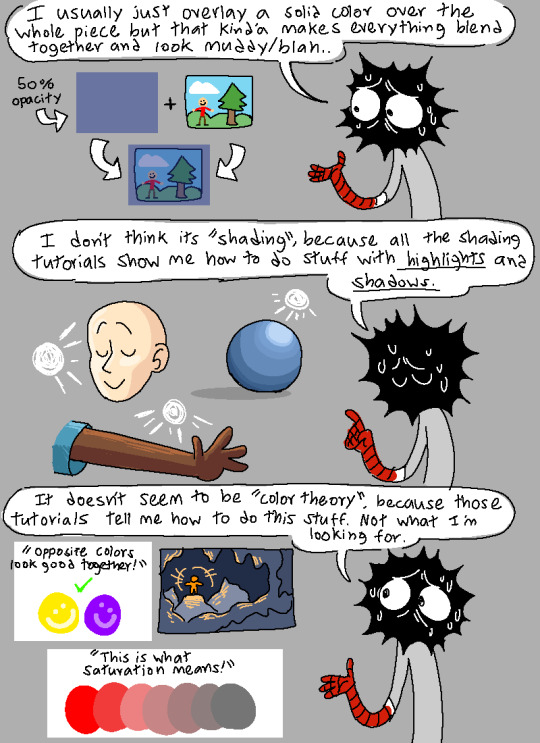there is good to be found (he/him) icon made with pepperjackets on picrew
Don't wanna be here? Send us removal request.
Photo










Sarah Snippets on Etsy / Redbubble
See our #Paper Art tag
711 notes
·
View notes
Text
I can't post this photo legally but I can link it so please look at this incredible fella
197 notes
·
View notes
Text

Scott Prior (American b.1949), Laundry Line in Autumn, 2016, Oil on linen
2K notes
·
View notes
Text

Cooking up some new blorbos for myself
106 notes
·
View notes
Text

Fiona Finnegan (Irish, b. 1979, Newry, Ireland, based Belfast, Ireland) - How the Light Gets In, 2022, Paintings: Oil on Linen
4K notes
·
View notes
Text
one of the wild things about people’s stubborn insistence on misunderstanding The Ones Who Walk Away From Omelas is that the narrator anticipates an audience that won’t engage with the text, just in the opposite direction. Throughout the story are little asides asking what the reader is willing to believe in. Can you believe in a utopia? What if I told you this? What about this? Can you believe in the festivals? The towers by the sea? Can we believe that they have no king? Can we believe that they are joyful? Does your utopia have technology, luxury, sex, temples, drugs? The story is consulting you as it’s being told, framed as a dialogue. It literally asks you directly: do you only believe joy is possible with suffering? And, implicitly, why?
the question isn’t just “what would you personally do about the kid.��� It isn’t just an intricate trolley problem. It’s an interrogation of the limits of imagination. How do we make suffering compulsory? Why? What futures (or pasts) are we capable of imagining? How do we rationalize suffering as necessary? And so on. In all of the conversations I’ve seen or had about this story, no one has mentioned the fact that it’s actively breaking the fourth wall. The narrator is building a world in front of your eyes and challenging you to participate. “I would free the kid” and then what? What does the Omelas you’ve constructed look like, and why? And what does that say about the worlds you’re building in real life?
1K notes
·
View notes
Text
Once upon a time there was a city called Omelas, where everyone lived good and happy and fulfilling lives.
And in time it came to pass that a young man by the name of Outis came of age in that city; and, as with all who lived in that city, he was taken to a secret place where a wise elder showed him a small cold dirty room. And in that room there was a small cold dirty child, naked and hurt and starving, who had never known the least human kindness.
And the wise elder said to Outis, “In our city, everything is good and no one suffers. But it all depends on this child. If the least kindness is shown to him, our city will become like all other cities. There must always be such a child in Omelas.” …
…And Outis said to the elder, “If our city becomes like all other cities, many children will suffer.” And so he became a citizen of Omelas. And Outis led a good and happy and fulfilling life; and the child continued to suffer.
…And Outis said to the elder, “I will have no part in this evil thing.” And he walked away from Omelas. And Outis led a cold and short and brutish life; and the child continued to suffer.
…And Outis said to the elder, “I will have no part in this evil thing.” And he took the child and bathed him and cared for his wounds. And the city of Omelas became like all other cities; and many children suffered there.
…And Outis said to the elder, “I will have no part in this evil thing.” And he took the child and bathed him and cared for his wounds. And the city of Omelas carried on as it always had; and from that day forth no child suffered there.
…And Outis said to the elder, “I will have no part in this evil thing.” And he took the child and bathed him and cared for his wounds. And the city of Omelas became like all other cities; and many children suffered there.
But Outis, who would leave no child to suffer, worked tirelessly to save each one of them, and to build with his own hands a city in which everyone lived a good and happy and fulfilling life; and so in time it came to pass that the latter days of Omelas were greater than the former. And for ten trillion years Omelas carried on, and no child ever suffered there again.
…And Outis said to the elder, “Nevertheless, this child is my son, and I will not leave him to suffer.” And he took the child and bathed him and cared for his wounds. And the city of Omelas became like all other cities; and many children suffered there. But Outis did not care, because he valued the well-being of his son over all of them.
…And Outis asked the elder, “Why?” And the elder showed him to a library filled with books. And Outis studied the books for many years. And when he was an old man with a gray beard, Outis went out of the library and returned to the child and took the child out of the room, and in the child’s place he put a stone. And the stone was naked and dirty and cold; and the child Outis took and bathed and cared for. And Omelas carried on as it always had; and from that day forth no child suffered there.
Once upon a time there was a city called Omelas, where everyone lived good and happy and fulfilling lives; except for one child, who suffered so that the city might prosper. And all who lived there knew of this…
…And each citizen of Omelas, having looked into himself and seen that he would stand by while a child suffered in abject misery, found in himself a new willingness to do dark and evil deeds. And in time, all those who lived in Omelas suffered.
…And each citizen of Omelas lived with the gnawing guilt of his complicity, and the abiding terror that his own child would be chosen as the next to suffer. And in time it seemed to them that they could take no joy in any of the glories of Omelas.
…And one night, the child rose up and went out of his room and killed all the people of Omelas in their sleep.
Once upon a time there was a city called Omelas, where everyone lived good and happy and fulfilling lives. And each morning, each citizen of Omelas was taken to a small cold dirty room, and shown a small cold dirty child, and told that the child must suffer so that his day might be filled with all good things.
And all in Omelas agreed that it was better that one child should suffer than many; and none of them ever asked if it was the same child they saw each morning. And after all, one small cold dirty child looks much like another.
Once upon a time there was a city called Omelas, where everyone lived good and happy and fulfilling lives; except for ten thousand children, who suffered so that the city might prosper. And all who lived there knew of this…
…but none of them were ever taken to see the children in person, so none of them ever did anything about it.
…and whenever anyone saw such a child and “shouldn’t we rescue that suffering child?”, the other citizens of Omelas laughed and replied to them, “Naïve fool! Don’t you know that a child must always suffer in Omelas, so that the city may prosper? Otherwise it would become like all other cities, and many children would suffer.”
And everyone nodded wisely and went along with their days; and so ten thousand children continued to suffer where it might have been only one.
Once upon a time there was a city called Omelas, where everyone lived good and happy and fulfilling lives.
And in time it came to pass that a young man by the name of Outis came of age in that city; and, as with all who lived in that city, he was taken to a secret place where a wise elder showed him a small cold dirty room. And in that room there was a small cold dirty child, naked and hurt and starving, who had never known the least human kindness.
And the wise elder said to Outis, “In our city, everything is good and no one suffers. But it all depends on this child. If the least kindness is shown to him…”
“…the city will continue on as it always has, only your internet will be slightly slower.”
And Outis went back up into the city, and on that day he became a citizen of Omelas; and the child continued to suffer.
“…the best predictions of our scientists suggest that there will be a slight average decrease in various hard-to-measure kinds of happiness, which nevertheless in total adds up to more suffering than this child experiences.”
And Outis said to the elder, “I will have no part in this evil thing.” And he took the child and bathed him and cared for his wounds. And the average happiness increased in some ways and decreased in others, and the net effect might have been negative, but the best results on the matter had p > 0.05, so the scientists of Omelas could not rule out the null hypothesis.
Once upon a time there was a city called Omelas, where everyone lived good and happy and fulfilling lives.
And in Omelas there was a naked dirty child in a small dirty room; because the child was agoraphobic and was making mudpies.
Once upon a time there was a city called Omelas, where everyone lived good and happy and fulfilling lives.
Very few people told stories about Omelas, but it was a very nice place to live in.
23K notes
·
View notes
Text

the gentleman
192 notes
·
View notes
Text

Charles van den Eycken (1859-1923) "Budding Artists" (1907) Oil on canvas
233 notes
·
View notes
Text

shoutout to that one beta Gonta design that is completely identical to the final version except he's got bandages/hand wraps on

(will reblog this with some more thoughts on Gonta's overall design!)
201 notes
·
View notes
Text
i was at a cafe today and they had glasses of sugar with like a tiny lid on the tables and one lid was open so a bunch of wasps were climbing in and literally shoving the sugar into their mouths with their little paws

they hit the sugary jackpot
8K notes
·
View notes
Text
Gonta Gokuhara is not the sweet little boy you think he is. --- A thought experiment showcasing how easy it is to maliciously misinterpret a character's canon actions and make them sound worse than they actually are.
Day 4: Gentleman.
Gonta takes care to make sure him and Kokichi are still on favorable terms.
For @malicious-gonta-week Day 4!
Aka the subtle Gaslighting chapter.
#ohhhh this is a really interesting take!!#malicious gonta week#is apparently a thing?#fanfiction#gonta gokuhara#Danganronpa
16 notes
·
View notes
Text

What ever floats your boat.
1K notes
·
View notes
Text




portraits of utility poles
46K notes
·
View notes














